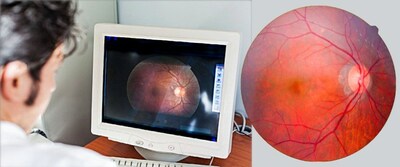New research shows that a short online course designed by global eye care nonprofit Orbis International successfully trains health care workers to identify signs of glaucoma at a level similar to local ophthalmologists.
|
|
| [27-November-2023] |
|
The course is a promising solution for the shortage of eye care professionals to screen for the blinding disease in low-resource areas NEW YORK, Nov. 27, 2023 /PRNewswire/ -- New research shows that a short online course designed by global eye care nonprofit Orbis International successfully trains health care workers to identify signs of glaucoma at a level similar to local ophthalmologists. The peer-reviewed study, published in the British Medical Journal (Open), found that non-ophthalmic health care workers already trained to identify diabetic retinopathy could also effectively learn to detect signs of glaucoma, both of which require examining images of the retina (back of the eye). Asia has the highest number of people living with glaucoma.
The study, which was conducted in Vietnam, demonstrates a new approach to recognizing glaucoma, a common blinding eye disease, especially in low- to middle-income countries. In these areas, trained professionals are scarce, and half or more of glaucoma patients discover they have the disease when it is too late for effective, sight-saving treatment. Training other health care professionals without a background in eye care to detect glaucoma can help address the need for more screenings than the limited number of trained ophthalmic professionals in any one region are able to provide. "Glaucoma is the leading cause of irreversible blindness around the world," said Dr. Olusola Olawoye, lead researcher of the study, Glaucoma Specialist and Consultant Ophthalmologist, College of Medicine University of Ibadan, Nigeria. "High-risk patients who have regular screenings can be prevented from going blind from glaucoma by receiving prompt treatment. This study demonstrates that non-ophthalmic diabetic retinopathy graders can screen patients for two major causes of blindness in one appointment, freeing up time for more highly trained ophthalmic experts to focus on patients with more complicated cases that need their services." The study, funded by a Novartis independent grant program, eXcellence in Ophthalmology Vision Awards (XOVA), enrolled 43 diabetic retinopathy graders, including nurses, technicians, and non-ophthalmic physicians, who had previously been trained through a project supported by Orbis and the Fred Hollows Foundation in Vietnam. Each grader took a pre-test, completed a five-hour online course on Cybersight, Orbis's telemedicine and e-learning platform, and then took a post-test. The course and pre- and post-tests were designed by Orbis medical experts for this study. The control group, consisting of 29 Vietnamese ophthalmologists, underwent a single test but did not complete the online training. The study found that graders' scores doubled following the online course, to a level similar to local ophthalmologists. "Asia has the highest number of people living with glaucoma," said Ngoc Pham, Country Director, Orbis Vietnam. "There is a growing gap between the burden of glaucoma in this region and the number of trained ophthalmologists. A new screening model that utilizes lower-level health workers is necessary to fight this disease, in Vietnam, the rest of Asia, and beyond." Seventy-six million people around the world live with glaucoma. That number is projected to rise a further 74% by 2040 due to an ageing and growing global population. This trend is expected to continue if new and more effective screening strategies designed for low-resource settings are not developed. Glaucoma does not show any symptoms in the early stages of the disease, and patients may not know they have it until they start to experience vision loss, which is irreversible. Early detection, before symptoms set in, is key to reducing the impact of vision loss. It is estimated that 95% of people with glaucoma in low- and middle-income countries are unaware of their disease. After such positive results from the study in Vietnam, Orbis, with funding from Sidra Tree Foundation, is now leading further glaucoma screening studies at occupational health centers in the sub-Saharan African country of Eswatini. Orbis researchers believe this accurate, low-cost method of detecting glaucoma will be a game-changer in reducing the burden of a leading cause of blindness in the country. About Orbis International Orbis is a leading global non-governmental organization that has been a pioneer in the prevention and treatment of avoidable blindness and vision loss for over four decades. Orbis transforms lives by delivering the skills, resources and knowledge needed to deliver accessible quality eye care. Working in collaboration with local partners, including hospitals, universities, government agencies and ministries of health, Orbis provides hands-on ophthalmology training, strengthens healthcare infrastructure and advocates for the prioritization of eye health on public health agendas. Orbis operates the world's only Flying Eye Hospital, a fully accredited ophthalmic teaching hospital on board an MD-10 aircraft, and an award-winning telemedicine platform, Cybersight. For the past ten consecutive years, Orbis has achieved Charity Navigator's coveted four-star rating for demonstrating strong financial health and commitment to accountability and transparency, placing Orbis in the top 3% of U.S. charities. For the past three years, Orbis has earned GuideStar's platinum Seal of Transparency. In 2022, Orbis earned "accredited charity" status from the Better Business Bureau by meeting all 20 of their standards for charity accountability. To learn more, please visit orbis.org. MEDIA CONTACT
SOURCE Orbis International |





